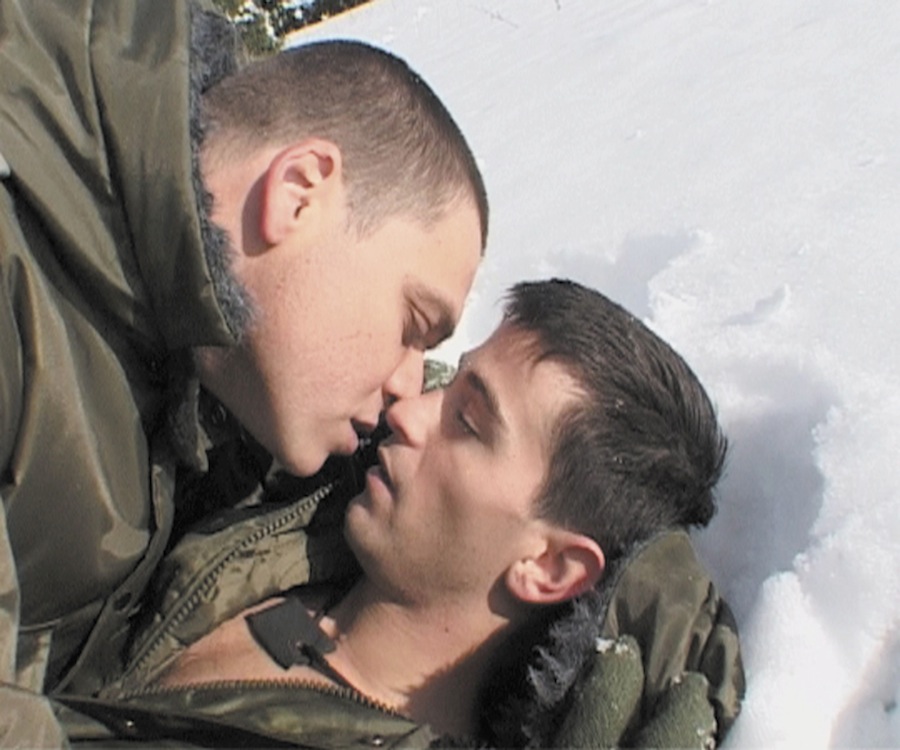 Yossi & Jagger
Yossi & Jagger
Directed by Eytan Fox
Israeli, 2002 (U.S. DVD release 2004)
In Hebrew with English subtitles
YOSSI & JAGGER exists in the space between the feature film and the documentary. Based on a true story, this well-made movie is produced in a way that makes you feel as if you’ve stepped into the barracks of a company of the Israeli army on the Lebanese border. A hand-held camera moves you through the metallic, ribbed hallways that connect one low-ceilinged room to another, and zeroes in on the characters living their lives in the cramped quarters, offering an intimate, almost voyeuristic peek into their everyday activities of survival and passing the time.
The movie opens on a sun-drenched, snow-covered plain and ends at sunrise the following day, adding to the sense that this really is “a day in the life” of an Israeli combat unit. The opening scene introduces us to Yossi and Jagger engaged in a lively snowball fight that culminates in their falling to the ground to make al fresco love. The rest takes place in those narrow confines of the barracks, where the cast of characters is as varied as you’d expect of any dozen young people: the chef who manages to turn K rations into gourmet cuisine; the soldier known as “Tibetan” who’s into reincarnation. Of the two central characters, Jagger has a life outside the military—he wants to be a rock star—while Yossi, the company commander, could be “in for life.” Of all the various flirtations and crushes that swirl around the barracks, the love between Jagger and Yossi is the only one that’s both mutual and consummated. Their relationship seems to be quietly grasped by the other soldiers, with the interesting exception of the women, what with Yaeli’s hopeless crush on Jagger. Amid a bull session involving the frequent use of the Hebrew word for “faggot,” an angry Yossi all but comes out to the other guys, producing a moment of tension that could go either way, but they end up laughing it off. This tolerance surprised me, having assumed that a movie about gay male lovers in the Israeli army would inevitably devolve into a tale of homophobia and coping with rejection. But these 21st-century soldiers, whose physical isolation doesn’t prevent them from being plugged into the latest pop song or movie, seem way too sophisticated for that. On the other hand, any reference to the Yossi-Jagger affair comes in hushed tones, suggesting that people see it as a private matter that’s not fair game for gossip or conversation—which would probably be true for a heterosexual affair as well. The fact that the gay men’s sexual orientation is a non-issue squares with reports from other countries where openly gay people are allowed to serve in the military—which is to say all Western countries except the U.S. The pettiness of the American policy is never more apparent than when Yossi and Jagger’s unit faces a treacherous combat situation in which lives are on the line and survival depends upon absolute loyalty and teamwork, and a man’s sexual orientation is pretty much the last thing on anyone’s mind. Military service is compulsory for both sexes in Israel (with some exceptions), and men and women are mingled in units almost indifferently (but women are spared most combat roles). The company in Yossi & Jagger includes eleven men and two women, and you could fairly cut the sexual tension with a knife. The sense one gets is that it’s sheer naïveté to suppose you can take a group of men and women in their early twenties, confine them to a stark barracks with not a lot to do, and expect nothing but “professional” behavior all the time. In fact, it’s mostly about the sex, whether real, hoped for, or talked about. Ofir has the hots for Yaeli (a woman), who’s infatuated with Jagger, who of course loves and is loved by Yossi.
Military service is compulsory for both sexes in Israel (with some exceptions), and men and women are mingled in units almost indifferently (but women are spared most combat roles). The company in Yossi & Jagger includes eleven men and two women, and you could fairly cut the sexual tension with a knife. The sense one gets is that it’s sheer naïveté to suppose you can take a group of men and women in their early twenties, confine them to a stark barracks with not a lot to do, and expect nothing but “professional” behavior all the time. In fact, it’s mostly about the sex, whether real, hoped for, or talked about. Ofir has the hots for Yaeli (a woman), who’s infatuated with Jagger, who of course loves and is loved by Yossi.




